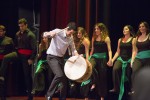At center stage, two students swayed their hips to upbeat Lebanese music. Their dresses, traditional black bedlahs embellished with coins, accentuated their dancing with rhythmic jingling.
Although Yara Azar, a second-year bioengineering student, has never worn the traditional garment before or danced on stage, she fondly remembers family gatherings when her grandmother taught her the belly dancing movements she performed at the 10th annual Lebanese Social Club at UCLA’s Culture Show Friday night.
The show was meant to celebrate and bring to light elements of Lebanese culture. The Lebanese Social Club at UCLA was founded in 2002 and is a non-political, non-religious student group, Azar said.
Students in the group said spending time with family, dancing and gathering for celebrations are central focuses of Lebanese culture.
“We want to show (people) we like to dance, how we dance, pictures of our country, the music we listen to and the food,” Azar said.
Though many of the students who performed Friday said they did not have much experience dancing, they took to the stage with energetic movements and confidence, smiles spread across their faces. They drew on their roots to learn the choreography.
“There was a lot of self-learning by board members, choreographing and teaching,” Azar said. “(We pieced) together things we’ve learned from aunts, cousins and family parties.”
The culture show included a dabke performance, a traditional Middle Eastern line dance, which students learned from YouTube videos.
It also featured several video skits and a Lebanese comedian. Both told jokes about the Lebanese lifestyle and customs.
Cyril Nader, a first-year aerospace engineering student, said he was happy to be a part of the event because he is proud of his culture.
Nader grew up in Beirut, Lebanon and moved to the U.S. in September to attend UCLA. The first thing he did when he arrived on campus was look for a Lebanese club.
One of the reasons Nader wanted to participate in the culture show is because he thinks the media’s portrayal of Lebanon focuses only on conflicts and negative aspects of the culture. Instead, he said Lebanese culture is lively and positive.
“(Lebanese culture is) close to the American lifestyle – very Western (and) open-minded,” he said. “There’s always something to do, you never get bored.”
Nader said he hopes to increase the Lebanese Social Club at UCLA’s presence on campus because the group has provided him with a sense of community and close friendships.
Caline Farah, a second-year political science student, said she was also looking to find a Lebanese community on campus when she came to the university. She has been a part of the Lebanese Social Club at UCLA since her first year and was an announcer at the culture show.
“Even though I am Lebanese, I am also American, and I like to bring a little bit of Lebanon to my American friends,” Farah said.
Farah lived in Lebanon for three years, but she and her family left in 2006 when she was 11 years old because of the outbreak of the Lebanon War.
“I could hear planes at night. It was scary,” she said. “I asked my mom if we could leave and at the time the U.S. military was evacuating U.S. citizens.”
Though there is conflict in Lebanon, Azar said the club remains a non-political and non-religious group.
“Looking at the Lebanese population, no two people have the same view on anything, even if they’re in the same family. In order to prevent any tension within the club, we focus on promoting the culture and bringing students together,” she said.
One thing Azar respects about Lebanese culture is its optimism, which she thinks is apparent within the Lebanese Social Club at UCLA and the culture show.
“We focus on what we have in common and embracing that makes us stronger,” Farah said.
